Decolonizing Health to Fight Fatphobia?
Or, Dismantle Western Civilization. Only, the actual history and science do NOT support the Body Positivity narrative. Obesity was a privilege of Imperial power, not a punishment.
Based on their statements and not their physical appearance, certain advocates of the Body Positivity movement seem easy targets for satire. Fatphobia, we are told, results from Whiteness and Imperialistic Western Civilization.
So our Progressive Warriors for Body Positivity and against Fatphobia now typically describe themselves as Decolonizing Fitness, Decolonizing Health or Wellness or Medicine, Decolonizing Standards of Beauty, et cetera.
But the historical reality of the Western tradition — as well as the history realities elsewhere, btw — differs considerably from the Fatphobia account. Indeed, over centuries and in many Western cultures, body fat — excessive body fat — was a marker of privilege. Browse the paintings of the Flemish artist Peter Paul Reubens (1577-1640), to start.
You were fat because you were a social elite. If a Westerner during the past six centuries, you were fat because you benefitted from Euro-centric globalized trade networks, from empire and colonization. Which for four centuries did include the Trans-Atlantic slave trade. Your body heft indicated your social status. Fat signaled privilege. Everyone recognized this.
The above late 19th century political cartoon captures this social reality neatly. Uncle Sam, an “expansionist first, last, and all the time,” who recently acquired colonies and vassal states in the Caribbean and the Pacific, is now a big man. Undeniably important. Recognized by the other imperial powers of Europe, and by imperial Japan.
In appearance here, Victor Gillam’s Uncle Sam resembles other big men such as the contemporaneous American politician William Howard Taft (1857-1930) or the then deceased but still popularly infamous “Boss” William M. Tweed of Tammany Hall.
Now, compare Gillam’s Uncle Sam, the obviously Body-Positive and proud Imperialist, to two of his contemporary Progressive counterparts: Sonalee Rashatwar and Dalia Kinsey, whose position is nuanced and worth serious consideration.
Both are true children of Uncle Sam. Likewise, both are NOT the victims of past American imperialism or of Western Civilization: they are the victors. The beneficiaries. They share much in common with all USA residents in our present moment, excepting perhaps mothers in need of baby formula.
Both benefit — to their health, perhaps destructively so — from living in the USA, from enjoying a lifestyle of enormous convenience. To take just two examples:
Food available on demand: 24 hours a day / 7 days a week, year-round. The seasons no longer apply. Food high in calories, sugar, and processed carbohydrates.
Machines for once human-powered tasks. Physical labor, by traditional standards, no longer a necessity for the vast majority of Americans. Transportation likewise available on demand: 24/7 year-round. Take a car. Take the elevator.
This was not always true. In fact, for most of USA history, it was not true. Even in the early 20th century, the USA did not have a national electrical grid; the automobile industry was in its infancy; and consumer refrigeration industry, likewise.
Obesity was a luxury…
Obesity was a luxury throughout much of American history, generally available only to potentates such as the Body-Positive William Howard Taft, 1st Provisional Governor of Cuba, Governor-General of the Philippines, and subsequent President of United States. The photo below is from 1908 (Public Domain: the © 1909, expired).
Taft was considered quite hefty for his day. Elite status. But over the past five decades or so, obesity has been democratized. Sonalee Rashatwar and numerous other Body-Positives could hold their own against William Howard Taft.
Yet our Body Positivity democracy has not come without cost. A cost which the “Ball Team” in this 1908 photo of factory workers (including child laborers) did NOT have the luxury of paying. The average USA life expectancy circa this photo, btw: 49.5 years for males, 52.8 years for females.
But now that William Howard Taft lifestyle has become normative and democratized, a blessing we call Body Positivity, roughly 2/3 of the present American population faces new health challenges which are eroding our previous gains in life expectancy over the 20th century. Challenges from lifestyle diseases.
Lifestyle Diseases
We now have a range of typical American lifestyles: all of which contribute to obesity, hyperglycemia, and hypertension. Then full-blown metabolic syndrome. A person with metabolic syndrome has a greater all-cause mortality risk — dying from anything and sooner. Metabolic syndrome is a lifestyle disease; or, rather a cluster of lifestyle disease conditions.
It is also voluntary. If a person eats clean and stays active, that person has almost no chance of developing metabolic syndrome, or Type II Diabetes, or Hypertension. All lifestyle diseases are — in a real sense — voluntary, optional. Nowhere in your DNA is it written that you must develop Type II Diabetes or Hypertension. Your daily habits matter. Your daily choices matter.
Dalia Kinsey, to her credit, knows that SAD — the Standard American Diet — is both wrong and deadly. Likewise, your author for this post, Data Humanist, has some basis for comparison when discussing lifestyles and diets — having lived and worked in Korea, Japan, Senegal (West Africa), UAE (Middle East), China, and Cambodia,.
Not all people practice — or even desire — one of the lifestyles typical to the USA. But typical only recently — within the past 6 decades or so. Not for all of USA history or Western Civilization.
Let’s look at some health trends in the USA. We will take in turn Diabetes and Prediabetes (Hyperglycemia), Hypertension (and Heart Disease), and Obesity (and Metabolic Syndrome).
Diabetes and Prediabetes (Hyperglycemia)
The CDC (18 January 2022) estimates that 37.3 million people (11.3% of the US population) have Diabetes. 95% of these people have Type II, lifestyle; only 5% have Type I, hereditary. [MedNewsToday]
Additionally, the CDC estimates that 96 million people aged 18 or older have prediabetes (38.0% of the adult US population). Childhood prediabetes and diabetes have also been dramatically increasing.
Why does diabetes matter? Because a person with diabetes is at increased risk for heart disease, stroke, kidney damage, nerve damage, and more.
The Diabetes Epidemic is Recent, NOT Historical
But again, our current state did not hold for all of American history or even much of the 20th century. Let’s look at data visualizations, courtesy of the CDC. (All images linked to source).
We have some choropleth maps as well. The graph above takes us from 1958 to 2015; the maps below, from 2004 to 2016, showing a significant increase in just twelve years.
The American diabetes epidemic is a recent one. In fact, it starts just after the great wave of decolonization in Africa and Asia begins. It starts in the 1960s, not 1619. If history matters.
Hypertension (and Heart Disease)
Back to the CDC for our definition and statistics:
High blood pressure, also called hypertension, is blood pressure that is higher than normal. Your blood pressure changes throughout the day based on your activities. Having blood pressure measures consistently above normal may result in a diagnosis of high blood pressure (or hypertension).
The higher your blood pressure levels, the more risk you have for other health problems, such as heart disease, heart attack, and stroke.
Some key CDC stats:
Nearly half of adults in the United States (47%, or 116 million) have hypertension, defined as a systolic blood pressure greater than 130 mmHg or a diastolic blood pressure greater than 80 mmHg or are taking medication for hypertension.
In 2019, more than half a million deaths in the United States had hypertension as a primary or contributing cause.
Hypertension directly contributes to more serious cardiovascular diseases. In 2019, the American Heart Association (AHA) estimated that at “least 48 percent of U.S. adults have some form of cardiovascular disease.” Good news: the medical profession has gotten much better at treating it. Bad news: the rate cardiovascular disease also continues to increase.
One alarmist prediction from the AHA in 2017:
The AHA predicts that costs related to the disease will double from $555 billion in 2016 to $1.1 trillion in 2035.
That “could bankrupt our nation’s economy and healthcare system,” according to AHA President Steven Houser, PhD.
It was not always so. Not for American nor western societies. Nor any known societies.
Dalen, James E., et alia, in a peer-reviewed study, “The epidemic of the 20th century: coronary heart disease” (doi: 10.1016/j.amjmed.2014.04.015), observed: “Heart disease was an uncommon cause of death in the US at the beginning of the 20th century. By mid-century it had become the commonest cause.”
Heart Disease: from an uncommon to the most common cause of death in less than one century, the 20th century.
According to these researchers, it seems unlikely that heart disease will remain the most common cause of death — this due to both medical advances and competing chronic illnesses. But do not celebrate wildly just yet.
The personal and societal costs of heart disease will not go away, even if the mortality rate is reduced. Nor does this negate the impact of heart disease as a comorbidity. If you have heart disease, you remain at a greater all-cause mortality risk.
So hypertension and heart disease are increasing. We can blame William Howard Taft, a known white American Western Civilization imperialist. Not sure how that helps.
But let’s round our review out by looking at trends for Obesity (and Metabolic Syndrome) in the USA.
Obesity (and Metabolic Syndrome)
Above, “Boss” Tweed by Thomas Nast, 1871. If a person is clinically obese, such as William M. Tweed was, that person has a much greater chance of developing hypertension and hyperglycemia. There’s more.
For key stats and info, back to CDC, “Obesity is a common, serious, and costly disease” (30 September 2021):
Obesity-related conditions include heart disease, stroke, type 2 diabetes and certain types of cancer. These are among the leading causes of preventable, premature death.
The US obesity prevalence was 42.4% in 2017–2018.
From 1999–2000 through 2017–2018, US obesity prevalence increased from 30.5% to 42.4%. During the same time, the prevalence of severe obesity increased from 4.7% to 9.2%.
It was not always so. Again, men like William Howard Taft and “Boss” Tweed were American outliers, not the norm. USA Facts reported in 2019 that
Obesity hasn’t doubled. It’s nearly tripled in the United States over the last fifty years. … In the early 1960s, fewer than 14 percent of the individuals possessed a body mass index (BMI) of over 30. Today, the figure collected by the CDCs National Health and Nutrition Examination Survey (NHNES) is closer to 40 percent.
For the first half of 20th century in the USA and Western Europe, obesity was not a public health issue. The present obesity epidemic has nothing to do with the Age of Imperialism, or the Trans-Atlantic slave trade, or the like. Not a thing. But obesity has nearly tripled since the early 1960’s.
In the USA, many people of recent European ancestry — many “white people” —suffer from obesity. Increasingly also, American children suffer from obesity.
Please consider the following the graph from The National Institute of Diabetes and Digestive and Kidney Diseases (NIDDK), showing “Trends in obesity among children and adolescents ages 2–19 years, by age: United States, 1963–1965 through 2017–2018.”
Obesity goes hand-in-hand with metabolic syndrome. The great American public health crisis is not Covid and certainly not Racism. We have no shortage of sick (chronically ill), fat, unhealthy white people. No shortage whatsoever.
For Americans aged 18 to 45, you can make a compelling case for Fentanyl. But for the American society at large, the greatest public health crisis is metabolic syndrome.
Concluding Remarks
The current fashionable historical and cultural explanations for Fatphobia and the like share two common problems. First, history refutes them all. Tell it to Reubens, or Boss Tweed, or President Taft.
Second, medical science denies the cultural relativism of health. If you are an adult with a resting blood pressure of 200/140, it matters little what genetic ancestry or gender identification you claim: you are in a state of hypertensive crisis.
Back to history, briefly:
Widespread American obesity is a recent phenomenon. It derives from consumer culture and from lifestyle trends which originated in the 1960s, not 1619.
Obesity is also largely voluntary — not written in one’s DNA, but resulting from one’s daily habits. Habits which are not only accepted but rewarded, normalized, by much of society. Yet if you pay the cost to change your lifestyle, you need not be chronically ill, poly-pharmaceutically dependent, and so reliant on the state and Big Pharma.
But you must be willing to buck the status quo — not internalize it, celebrate it, and claim this as resistance. And you must be willing to escape wage-slavery. Own your time, not the crap you stay in debt to pay for. Do you think you have a troubled relationship with diet culture? More likely, you have one with money culture.
It seems a majority of Americans have no willingness to change their lifestyles — even if what they are doing is unhealthy, contributing to their debt, making them deeply unhappy, and helping to destroy our planet in the bargain. A majority, not a minority. So be it. Embrace it. Celebrate it. Enjoy the comorbidity.
But please do not present your destructive consumption as virtue; or worse yet, as resistance. You are the true sons, daughters, and non-binaries of William Howard Taft. You are the privileged, ruined children of a failing empire, but for now you are still living large at the expense of others and of the planet. The ways you live are inherently unhealthy and destructive, and this manifests in your bodies, and permeates and pollutes whatever environments you inhabit.
Advocates of obesity, you are not among the oppressed: you are the oppressors. But your time is coming. Your ways of life are no longer sustainable: not economically, not environmentally, not physically nor medically. Enjoy your freedom from the judgment of your peers — reality, you will not find so equally complicit.
Standard disclaimer: Our link to or citation of any source or person does NOT imply that source or person in anyway endorses American Exile. Our preferred pronouns remain: “small fringe minority” & “unacceptable views.”
And: Thank you for considering American Exile as an alternative source of analysis, commentary, and — context permitting — data journalism.

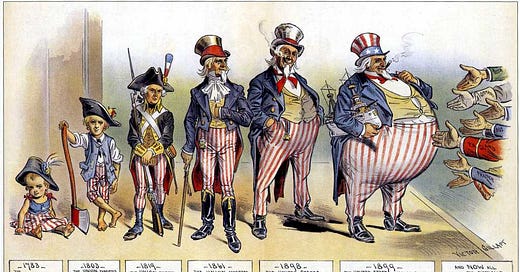



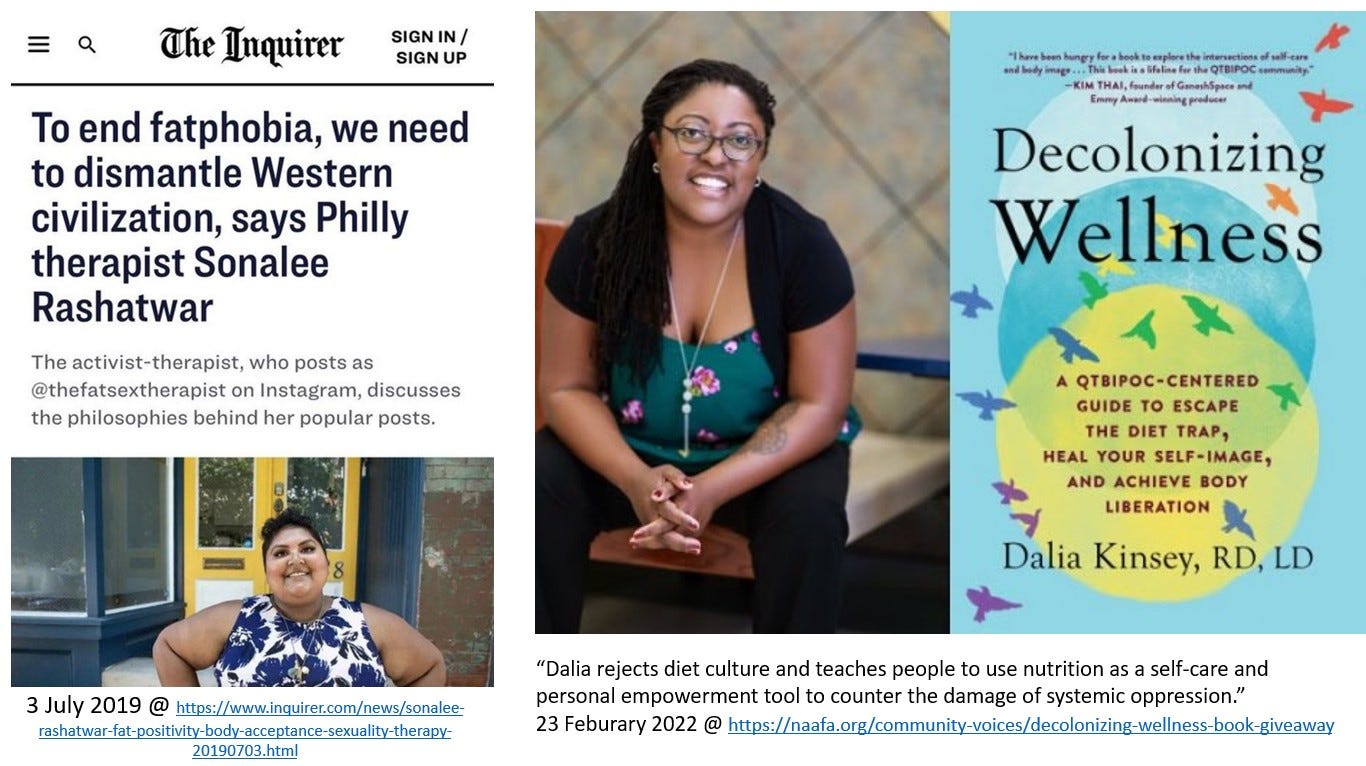
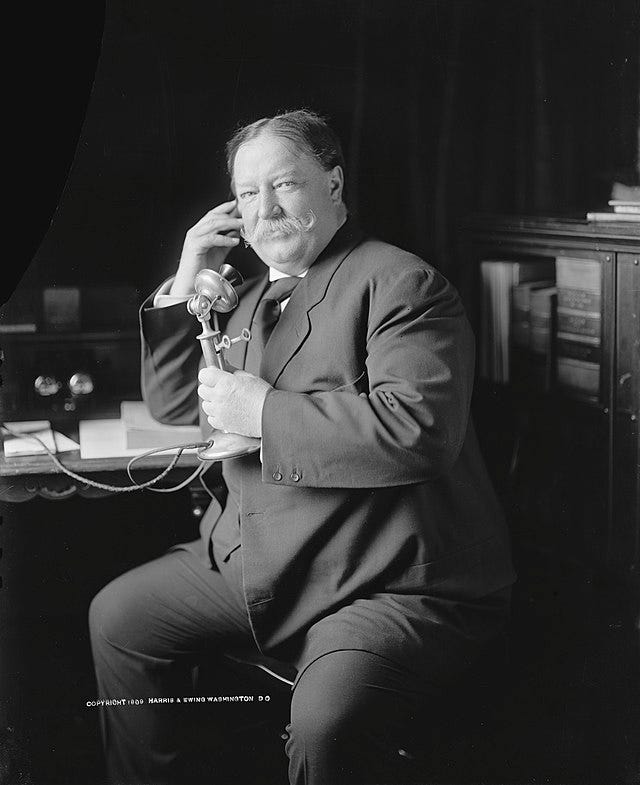


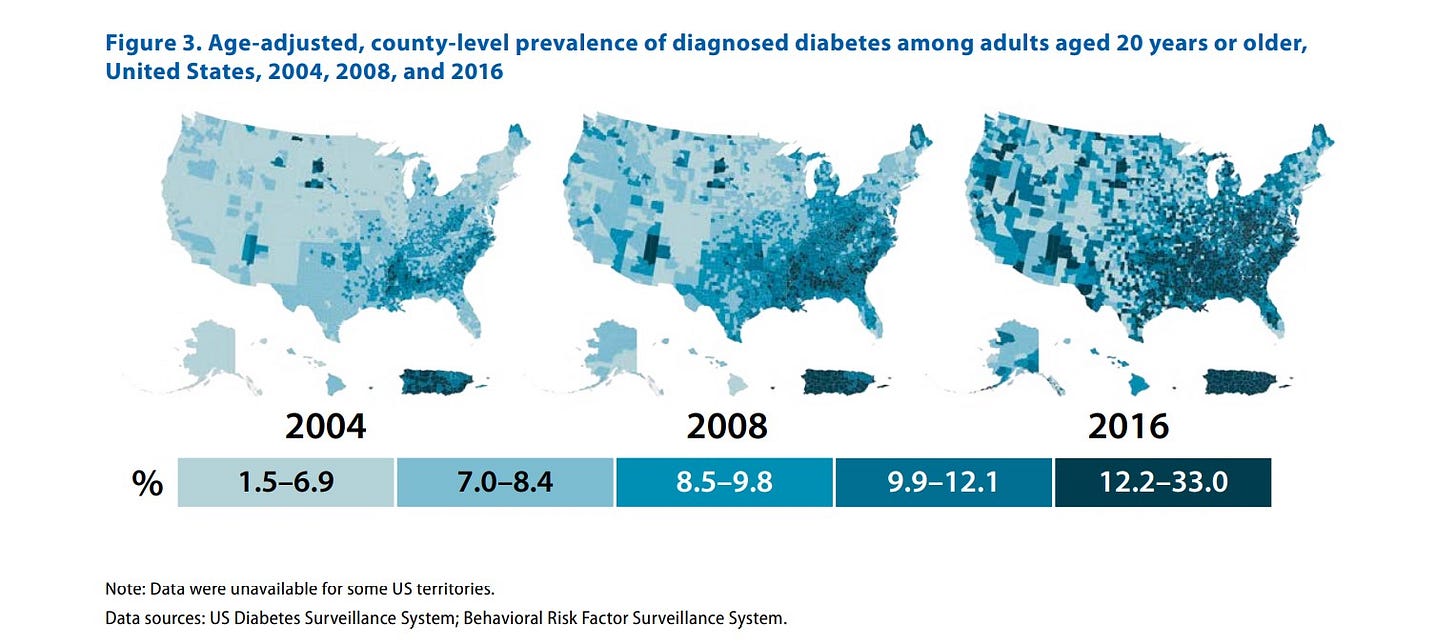
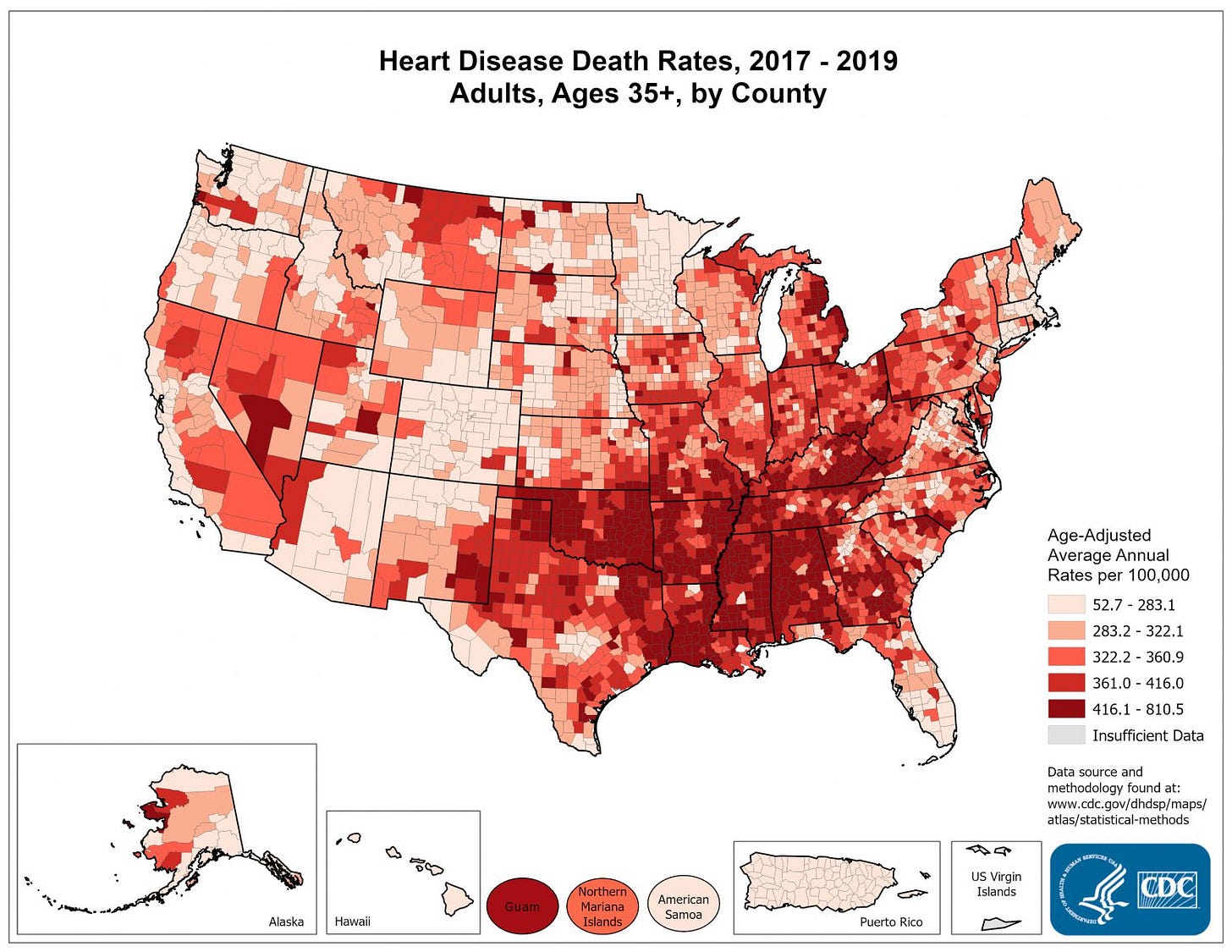
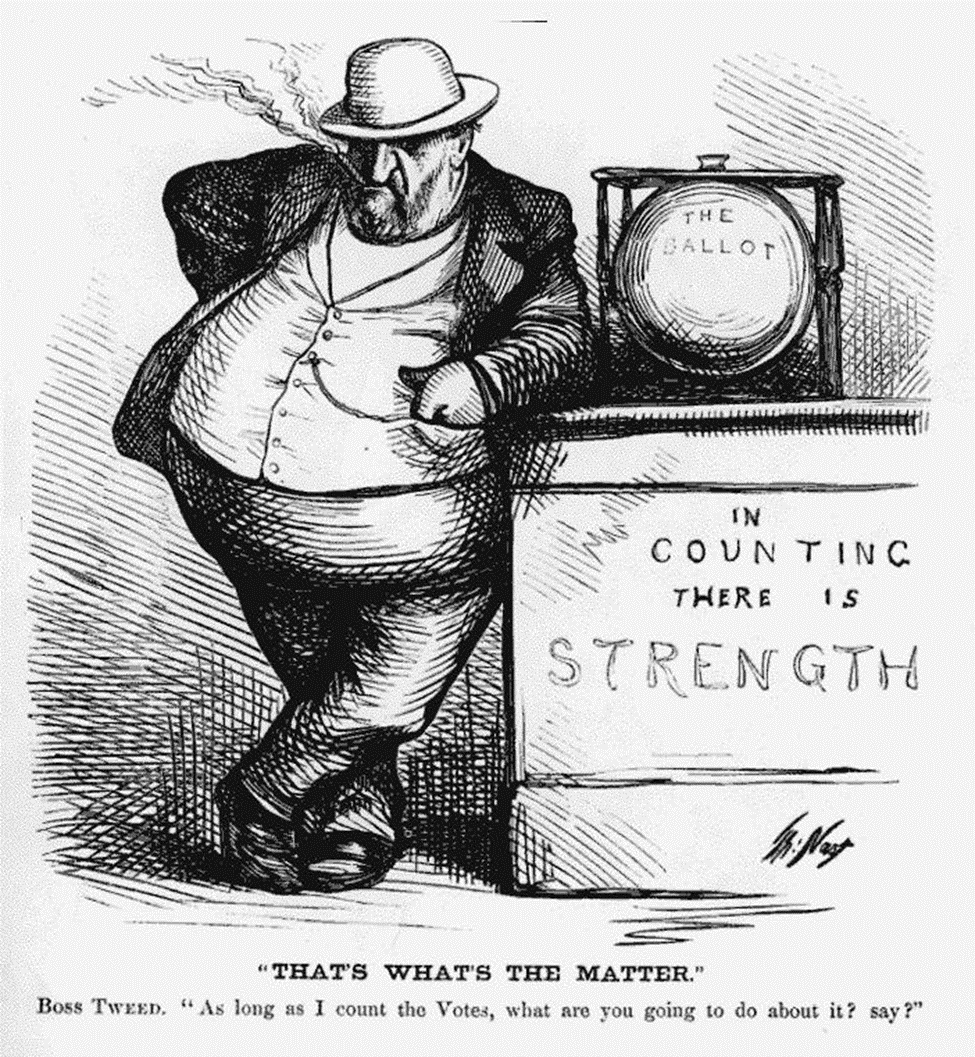

I intend to read your essay here to my 21 year old nephew who recently passed 375 pounds. It will not be received well by his mother, to be sure, but perhaps it will save his life.